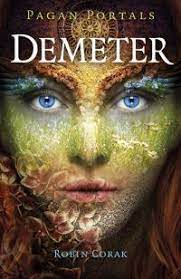This book is part of the Pagan Portals Goddess series. It hits the spot, with just the right amount of myth, historical background, psychological application, journaling prompts and ritual suggestions. Author Robin Corak is the author of another in the series, Persephone.
In Demeter, Corak emphasizes the multi-faceted nature of this Mother Goddess (known as Ceres to the Romans.) Mothering, of course, means many things, as does being mothered. “The mother archetype is not just about loving and nurturing,” Corak writes, “it is also about protection and advocacy to ensure that that which has been given life will survive and thrive.” A focus on the various themes and lessons of the Demeter is expansive. It includes “accessing the divine within, healing the mother wound, manifestation and fertility magic, the mother archetype as a powerful advocate for justice, and dealing with grief and loss in a way that can help us to heal and which honors our own divinity.”
Myths are enduring and powerful in large part because they are multi-valent, speaking to many different processes and relationships.
Corak takes the reader through the traditional Greek Hymn to Demeter, which tells of the “loving and perhaps overbearing mother” of the “beautiful yet naïve Persephone,” also known as “Kore.” Demeter is overwhelmed by grief when her daughter goes missing, and it turns out that she has been abducted. Though she’s a goddess, neither she nor Persephone “are afforded the right to make choices about their own lives… unless the gods will it.” Corak highlights this point. Some scholars cite as evidence of patriarchal dominance embedded in the religion of ancient Greece.
But the Demeter myth is more complex than that. Demeter is revered for both her power to give life, and also her power to destroy it. “Demeter is underestimated by all of the other gods and goddesses, and this causes them potential peril,” Corak writes. With dual power to create and destroy, Demeter is a metaphor for the cycles of nature. She is best known as the Great Mother who bestows on humanity the gifts of crops and grains. There are many monikers of praise for Demeter, and Corak lists them. They have mostly to do with beauty, fertility and sovereignty. Demeter was and is known as a goddess of health, birth, and marriage. She is also a matron of legal systems and civil society.
Unfortunately, Corak writes, “like most pagan goddesses during the time of Christianity, Demeter was assimilated by the church under the guise of the male Saint Demetrius.” Still, there were sects throughout Greece that perpetuated the worship of Demeter.
The part of the book I found most interesting is the chapter on “Healing the Mother Wound.” Countless numbers of women (and men) grew up with inadequate mothering. Many of us survived childhood by the skin of our teeth, and have been left with varying degrees of complex post-traumatic stress--because of abusive mothers. “Demeter can help us learn to mother ourselves,” Corak writes, “as truly it is only ourselves that we can ever be truly confident will sustainably provide us with the unconditional love and acceptance that we need.” Whether or not such healing involves mothering a human child and/or nurturing life in a myriad of other ways, “Demeter’s story teaches us about the need for independence, self-sufficiency, and finding our own way.” As daughters, “we must intentionally envision who we are, who we want to be and what we want now that our lives have changed.” Corak offers a ritual for mother-daughter separation and writing prompts about how to mother oneself.
Then, the next chapter flows naturally as it’s about grief and loss, invoking Demeter Chthonia. While working on this book, Corak’s 18-year-old niece Anam died of a rare disease, and some of the proceeds of this book will go to a foundation in Anam’s name. Losing Anam prompted Corak to pursue a long-held goal she had of becoming a certified end-of-life doula. Corak writes that she has learned though her work with Demeter “the need to be able to allow those around me to grieve in their own time and way as well.”
When Persephone disappears, it is the goddess Hecate who accompanies Demeter on her journey to find out what has happened. Unlike the other deities who are apprised of the disaster, Hecate is the one who does not judge or condemn Demeter for expressing grief and rage. The strength of one like Hecate is to just be present with someone who is grieving. This is so much better than the unsolicited advice and intervention that is often directed toward someone in the midst of great suffering.
Following the chapter about loss and grief, Corak treats us to one on “Demeter Chloe: Manifestation Magick.” Demeter is the goddess of intentional planting, nurturing, cultivating, and harvesting. Here Corak offers some recipes and spells for focusing on what we want to receive. “This need not only occur when the external or internal seasons are at their peak, for Demeter’s myth teaches us that life and growth can happen even in the darkest of times.”
This is a book to read again and again.
~review by: Sara R. Diamond
Author: Robin Corak
Moon Books, 2022
105 pp., $12.95
Demeter (Pagan Portals)

©
2010 - 2024
Facing North
